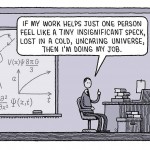I think this is going to be the rhythm of my weekly blogging for the foreseeable future – on Tuesdays a new ReligionProf podcast will appear, and on Wednesdays I will add additional comments, links, and other materials in a blog post to go along with that new podcast.
In this week’s episode, I was delighted to have a chance to chat with Kimberly Winston, a journalist that I had spoken to previously about the topic of religion and science fiction, when she was working on her article “Mormons in Space: Sci-Fi or No Lie.” We would have chatted anyway, since Kimberly is the moderator of a panel that I am on tomorrow in Columbus, Ohio at this year’s Religion News Association conference. The panel title is “Close Encounters of the God Kind: Religion and Science Fiction.” In addition to me it will feature well known science fiction author John Scalzi, soon to be novelist Farah Rishi, and pastor and novelist David Williams.
I’m the only one on the panel who hasn’t written and isn’t working on a science fiction novel, you’ll notice. Should I try to rectify that? I obviously can’t do so by tomorrow, but I wonder if I should be trying to branch out beyond the short story (I hope to have another one coming out in the not too distant future, with a bit of luck).
At any rate, I just finished reading David Williams’ novel When the English Fall – glad to have managed to do so before I meet him! The story explores the fascinating scenario of a technology-incapacitating magnetic storm that leaves the Amish (and other related groups uand offshoots) better poised to “weather the solar storm” and its effects than “the English” of the title.
I have read John Scalzi’s novels Redshirts and The Collapsing Empire. The latter I had expected to engage with religion from things that I had read about it before diving into the novel (which is the first book in what will be an ongoing series). But the former, Redshirts, I had expected to be entertaining – and indeed, I found it to be laugh-out-loud funny – but not profoundly theological, exploring key religious questions such as whether God is a hack writer – in our universe or perhaps in others. I actually listened to it as an audiobook (narrated by Wil Wheaton) and I felt that Wheaton’s narration (the puzzling accent for Lt. Kerensky notwithstanding) made enhanced or at least nicely conveyed the story’s humor – and depth of emotion in the codas. I highly recommend the novel, in whatever format you choose to enjoy it.
Farah Rishi has written about the situation of Muslims in the present social and political climate, but has also written fiction intended for enjoyment in podcast form, which is something of a rarity – storytelling that is supposed to be enjoyed in audible rather than written form.
Listen to the podcast above to find out what science fiction Kimberly and I recommend, for viewing as well as reading or listening. Also, I understand that the panel at the Religion News Association conference will most likely be recorded, and so when that is available, I will also spread the word about it here and elsewhere on social media.
The blog post associated with my podcast episodes is of course a natural place for discussion about the episode to occur and for you to offer your thoughts and feedback about it. I hope you enjoyed it, but either way, I hope you’ll engage with it in comments on this post!
















